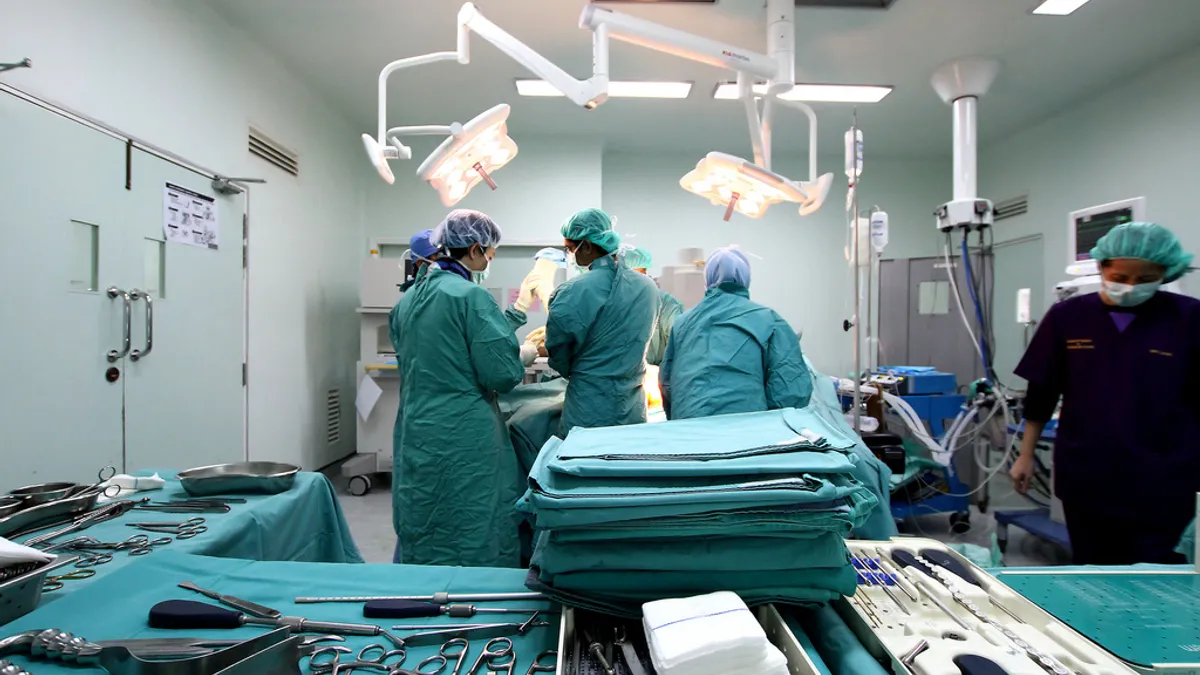As COVID-19 hotspots spring up across the country, hospitals must once again grapple with how to take care of those patients while keeping other services open safely.
When the virus first hit earlier this year, CMS, along with some state and local authorities, placed restrictions on elective procedures, mandating systems had a certain amount of personal protective equipment on hand before performing them.
When surges eased the agencies reeled those restrictions in, putting the power back in the hands of health systems — many facing steep financial losses and eager to take on backlogs.
During earnings calls with investors this fall, many medtech companies expressed confidence in hospitals' improved ability to simultaneously manage COVID-19 patients and typical caseloads.
"With the continued variability of infection rate, we believe that hospitals are better prepared to ensure that these types of elective procedures can still be performed at some level, unlike the dramatic drop that we saw in April," Stryker VP of Investor Relations Preston Wells said in late October.
Zimmer Biomet focused on the fact that, going forward, a more pertinent hamstring might be patients not feeling comfortable seeking elective care while hospitals are still receiving COVID-19 patients. "We can't influence the virus, but we could try to influence patient fear," said CEO Bryan Hanson in describing a campaign the company is running to inform consumers of their options during COVID-19.
Yet, rising cases nationwide mean resources enabling elective surgeries to go on are again strained. In many ways it's a repeat of what U.S. facilities went through in the pandemic's early days as hospitals struggled to secure enough staff and equipment. At that time, hospitals began having access to relief funding from Congress. But another bill, which lobbies have been calling for, does not seem imminent.
Elective procedures such as knee or hip replacements that often can be delayed are also the most lucrative for systems, with many facing major financial fallout after similar predicaments earlier this year. But most electives are necessary, just not emergencies.
At Mayo Clinic in Northwest Wisconsin, both the ICU and medical surgical units are full, a spokesperson said Monday. The system stopped scheduling elective care starting Oct. 31 in order to free up beds for COVID-19 patients.
Other Mayo Clinic locations in Wisconsin and Minnesota have also reduced elective care, though the system will remain open for trauma, emergency and urgent care needs, a spokesperson said.
Cleveland Clinic is seeing the highest numbers of patients with COVID-19 since the start of the pandemic and started rolling back elective procedures Wednesday, according to a statement.
It initially planned to postpone non-urgent surgical cases requiring an inpatient stay at most of its hospitals for Friday and Monday but extended those cases through this coming Friday. It will still perform outpatient surgeries as scheduled, along with urgent and emergent surgeries including heart, cancer and neurological cases.
And across the country in Idaho, St. Luke's Health System stopped scheduling elective procedures requiring an overnight hospital stay until Christmas, according to a statement.
St. Luke's Boise, Meridian, Magic Valley and Nampa medical centers canceled elective cases scheduled this week, though its hospitals in McCall, Wood River and Mountain Home will not cancel any currently scheduled elective procedures.
Procedures not requiring an overnight hospital stay will not be impacted, St. Luke's said.
Intermountain Healthcare is running out of staffed ICU beds but forging ahead with with non-COVID-19 care — including elective procedures — to help people keep up with their routine health needs, CEO Marc Harrison said during a press conference Tuesday with other Utah business leaders.
While most joint replacements historically require an overnight stay, the 24-hospital system is performing half of the joint replacements in its St. George, Utah, locations as outpatient procedures to free up beds and staff, Harrison said.
Advocate Aurora Health, with hospitals in Wisconsin and Illinois, announced Tuesday it would scale back elective inpatient procedures by 50% at its sites — or more depending on local needs.
"This will help free up more staffing to provide the critical patient care needed during this time," the system said in a statement. "Future changes will depend on staffing and surge levels and will require constant adjustment."
Advocate Aurora will still offer urgent care services and said it would alert patients to any changes in scheduled elective procedures or screenings.
COVID-19 inpatient admissions routinely have lengths of stay two to three times longer than non-COVID-19 patients, and about 300 employees at Mayo Clinic in Northwest Wisconsin are on work restrictions due to novel coronavirus exposures, according to a spokesperson.
Demand for temporary healthcare staff is also on the rise again, similar to the beginning of the pandemic. Travel nurse staffing firm Aya Healthcare reported a 57% increase in demand for travel nurses Wednesday, and said open "crisis nursing" positions increased 291%.
"This means I don't have three, four or five weeks to wait. I need these people like yesterday in order to take care of the patients and the heads that are in my beds right now," April Hansen, EVP of workforce and clinical services at Aya, said.
Systems are individually planning how they'll restart electives when surges eventually wane.
Mayo's plan is based on a combination of data points including staff absences, sustained low test positivity rates and a COVID-19 inpatient census. As figures decrease, it will incrementally return to standard operations, a spokesperson said.
Cleveland Clinic will reevaluate scheduled surgical cases on an ongoing basis as the pandemic continues, and is closely monitoring supplies, including availability of PPE, beds and staff, a spokesperson said.
Healthcare leaders throughout the pandemic have chided a lack of transparency into the national supply chain for PPE especially, straining their efforts to treat both COVID-19 and non-COVID-19 patients.
Leaders with the American Hospital Association, American Medical Association and American Nurses Association sent a letter Tuesday to President Donald Trump imploring his administration work closely with President-elect Joe Biden's transition team to share critical information related to the pandemic.
They asked for "real-time data and information on the supply of therapeutics, testing supplies, personal protective equipment, ventilators, hospital bed capacity and workforce availability to plan for further deployment of the nation’s assets."
Maria Rachal contributed to this story.


















